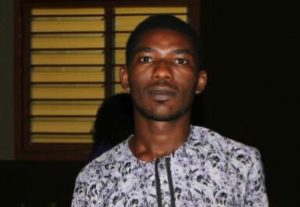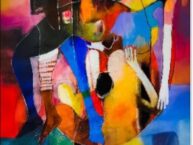 Obinna Jones. Nigerian. Sadly adult. Studying Physics at Imo State University, Owerri. Writes, reads and stalks Facebook celebrities. Has a dream of winning a Nobel prize in Physics or literature or both. Has works of fiction on elsieisy’s blog and sidomexentertainment’s blog.
Obinna Jones. Nigerian. Sadly adult. Studying Physics at Imo State University, Owerri. Writes, reads and stalks Facebook celebrities. Has a dream of winning a Nobel prize in Physics or literature or both. Has works of fiction on elsieisy’s blog and sidomexentertainment’s blog.
A River Ends in an Ocean.
ÁGBỌNMÁGBÈ.
His release from detention was as ordinary as his arrest; a policeman had just opened the cell that had housed him for three months and told him he was free to go.
No explanations, no charges. Nothing. Go home.
He walked out of the holding area without a word and into the reception hall where a rechargeable lamp gave life to lengthy shadows and little light. The officer at the counter wordlessly handed him his fading green lace buba and he threw it over his skinny mosquito-ravaged body.
When after some moments he had still not moved from where he stood, the policeman looked up from his phone and trained the low light on him.
“Eh ehn?” he asked, “they said you can go, why are you still here?”
“Ehm,” he stammered out a reply because interactions over the past months had been mostly monosyllabic, “I kind of live far from here.”
The officer gasped and looked at him like he was joking and when he kept standing there unable to maintain eye contact, looking at the shadow above his head instead, the officer started to laugh.
“You mean … you want … I should …” he laughed so hard he knocked the big register across the counter and on the floor beside him. When his laughter sounded like a small generator out of fuel, he started calling his colleagues in other offices to come and witness what was going on.
It was enough answer to his request than he expected and the next instant he fled out the door as quick as his limbs could carry him, at the gate a uniformed policeman in an oversize sweater herded him out and bolted it behind him.
It was still very dark and he could not go back to ask for the time because he did not know how they would react this time, but he knew it was not night as people crawled about in day clothes, early Lagos hustlers, he told himself. He was grateful that his release had not come in the heat of day because a long trek lay ahead of him.
He avoided the small crowd congregated in wait of buses at Idimu Bustop when he got there and carrying with him, three months worth of shit, piss and unwashed skin, he headed home.
Muttering to himself and needlessly casting a cautious look behind before laying ancestral curses on the police force, he reminded himself that he had been detained for a whole of three months because he was poor. You could be anything around here but poor. A poor person was nothing.
The street lights were dead and stood like zombie sentries.
Along the wall of the Government College he could smell piss but it did not bother him because they were like neighbors to him now after living with them for three months.
Neighbors.
He remembered the pastor neighbor he had gotten into a fight with and had threatened to kill all his children with charms. Of course if he had charms as potent, he would be after making money and he had expected to have a good laugh each night when the pastor spent all his fear in casting and binding evil but the police showed up instead and carried him off like a bag of waste, well, without money he was a skin bag of waste.
A figure jumped down the wall just when he was past it, in the grey dark of approaching dawn he could see the tooth brush jutting out of the person’s mouth and he gauged the person to be no more than twenty years of age.
At twenty he had been in Onitsha, he remembered fondly, lying his ass off and selling every damn thing he could lay his hands on. From telling mechanics that there were ways he could employ to help them dispose of ‘condemned batteries’ without being caught by the environmental agencies to lying to the Chinese black marketers that he bought the ‘well used batteries’ at neck cutting prices, from working nights in illegal laboratories where they repackaged Paracetamol as Tramadol to selling them to unwary Northerners during break of dawn. At twenty he was a ‘businessman’ with women throwing themselves at him like lovers throwing themselves down the Eiffel Tower and older women settling trade over their daughters’ heads like cows in the market. At twenty, he thought, this young man was preparing for a day that will undoubtedly be filled with hanging out of buses with one hand and drinking alcoholic beverages with unbelievably ridiculous names while fighting agberos.
He seemed to smell better to himself now that he was beneath open sky, if dried piss could smell better, and the walk was doing amazing things to his joints.
Someone lay asleep on one of the blue steel benches of the BRT bus terminal and it crossed his mind to spook the person by shouting in his ears but he killed the thought when he saw the dreadlocks that snaked from the person’s head and the torn rags he wore.
His wives came to his mind and he wondered how they had been coping in his absence while he sat shitting and pissing himself in the cell, calling the name of his mother and cursing his father for making him. He may be poor and useless, but he was man of the house he reasoned and could still achieve an erection, that should count for something. His house too came to his mind each time the rains threatened to rip off the zinc roof of the police station (which to his disappointment never happened) and he hoped it hadn’t been swept away by a flood as it was on swampy land. If there was one thing he would die proud of, it was the land on which he had constructed a shanty. It is eighteen years now since he bought the land when the woman he later made a second wife had told him she was having a child for him. It had been the last time he spent any money as big and he vowed never to sell the land even if things went out of hand, though he never imagined things could become this bad because this was not just out of hand but out of mind as well.
First Bank, Ecobank, GTBank, Stanbic IBTC and Access Bank all lined up to his right and he realized that he had gotten to Ikotun; he hadn’t even taken note of the Technical College when he passed it. He was still alive and he believed walking from Idimu to Ikotun at sixty-one years has got to be some sort of feat. The day was brighter now and the trickle of people had become a steady stream. Someone knocked the air out of his lungs in his haste and he swallowed the expletives on the tip of his tongue when the person turned back and apologized. The young man in a suit and a tie looked like someone who could lock him up again for the next six months and he did not look forward to that so he nodded back, acknowledging the apology.
His thoughts drifted to his son, who no doubt at the moment would be hastening to work in London. Then he remembered that something like time difference existed but he still smiled and wanted to scream at the world:
I have a son in the abroad! He is rich! You think you are rich? My son is richer! You ride two big cars? Well, I ride two oversize women too!
But he kept quiet as he walked past a clutter of buses.
JIDE.
He had been one of the few lucky ones whose fathers could afford to send them out of the country to study without the aid of a scholarship. When he first left Nigeria with one of his father’s many business friends he was determined –even without the volumes of advices he had received- to do everyone proud. When he had enrolled at the Imperial College and the future looked as well lit as Christmas decorations with clear directions on how he would forge ahead, he met Paul.
Paul was from a wealthy family and that was how he had introduced himself:
“Hello, I am Paul and my parents are rich.”
He too had replied that his parents too had money but he did not have to tell his new friend that wealth in Nigeria and London did not belong in the same sentence.
What followed was as destructive as any relationship could be, uncontrolled spendings and nights they slept drunk, woke drunk and stayed drunk.
He discovered that they were both doing very poorly academically and he tried to turn it around, though he would have had more luck trying to win the premier league title with a bottom club midway into the season than making their grades rise like garri left in water.
It was during this period his father ran into trouble. In one of his letters, Ágbọnmágbè had explained to him how a deal went south but when he read it, it did not seem only to go south but involved his father running as far North as Kano to hide: he had borrowed some money for a container full of goods (which he later told him was counterfeit Naira notes) and the ship was held by Custom officials, the dangerous kinds that were more hungry for glory than money. It ended in the line of “manage your savings for the meantime, I will bounce back soon.” He had been misty eyed after reading the last line because his savings were as large as the pound notes in his wallet. His father never bounced back, Ágbọnmágbè “the river that never runs dry” became a parched land.
Paul had rushed to his rescue when he showed him the letter, even got him a two-way ticket to see his father and offer him some form of reassurance but he would always regret that action the most because what he saw in Nigeria broke his heart in more ways than one.
He had gotten out of the taxi in front of where his father had directed the driver from the airport and he faced a massive black gate protecting a two storey building, brown in color and a “beware of dogs” sign on the wall. His hand froze in mid knock when he heard someone call him from behind.
“Olajide? Olajide!” he turned to see his father’s hairy chest, a stick of cigarette protruding from his mouth and his nakedness covered by a lappa torn in more places than ten.
He stood there; too shocked to move from the gate towards the shack he had thought housed dogs when he had given it the briefest of glance from the taxi window. Ágbọnmágbè had been unable to even pay the taxi driver. He kept staring from his mother to his father and the other woman they said was a second wife who had a child clinging to her leg after he finally convinced himself that the wooden structure would not eat him. He stayed awake all night, smoking to keep the smells at bay and listening to all the night sounds in the creepy swamp surrounding them.
The next morning he had fled like the devil was after him (pitchfork, horns and all) and his father had not tried to stop him, he too had felt his uneasiness.
More determined than a puppy chasing its own tail, he jumped into the first taxi he saw after landing in London at the London City Airport. He ran up the stairs, two at a time, to the room he and Paul shared, full to the brim with tales of frustration and when he turned the key and pushed the door open, the emptiness greeted him. Their belongings were all intact, yet, the emptiness jarred him. Somehow he knew it. Paul was not there and it wasn’t until late in the night that the landlady had informed him what she knew of the disappearance, at least what she admitted Paul’s parents told her when they settled the bills and paid two years advance to keep him there until he finished college:
“They said their son’s behavior was becoming an embarrassment and though they didn’t blame you, they said they wanted him back home with them. He had refused of course, so his brothers came last night and whisked him away. Imagine their own son, carrying him off in the night like a spy during the World War.”
He fell back on the bed after she left and he felt drained of every blood in his body.
The college ejected him the next year for not paying his tuition fees and when the rent was up and he could not keep any job down, he didn’t wait for his landlady before moving into the streets.
Street life did not suit him at first and he went to sleep frequently on had cold floors, hungry and miserable. But he got to learn how to fight stray animals for food and homeless people for a comfy place to spend the night.
One day, he decided to return home and his whole plans hinged on his father agreeing to sell that piece of land. Because almost anytime Nigeria was mentioned in the news that he got from reading waste newspapers, it always mentioned Lagos. The land was in a rich area and the proceeds could help his family back at home.
ÁGBỌNMÁGBÈ.
He caught a free bus ride home from Ikotun after one of the drivers recognized him –he was popular the way drunks are in small towns. He alighted with his head high, shit, piss and unwashed skin smell mingled with a certain joy of being alive and having a home. He knew richer people who were dead and less rich people with no house. He turned into the street that should have been named after him but was named after one rich Alhaji, but he didn’t mind much at this moment as he approached home.
JIDE
He got a free flight back to Nigeria after the Home Office found that he had overstayed his time in London (though he more like walked up to the building to announce it himself) and he even shook the hands of the team handling his deportation back to Nigeria. The taxi driver that brought him home had first rejected the pound notes but after he pointed at the two storey building as his own and the man saw his clean shaven face and ‘foreign haircut’, he took it in good faith but threatened to return if the notes were fake. They weren’t of course; he had pinched them from fellow homeless beggars while they slept.
He found that his father had been in police custody for over two months and his father’s wives were feeding on the goodwill of neighbors. It did not take much to convince the younger wife to go to her mother’s place for some time and his mother needed no convincing on why the land should be sold, buyers were even on hand.
The land documents took a whole of fifteen minutes to be found in the brown coat pocket that hung from a nail in the door of his father’s room.
ÁGBỌNMÁGBÈ.
He stood there, transfixed to a spot and he kept on opening his mouth and closing it. His home was gone, wood and all and in its place were holes dug for foundations of a new building. He had to slap himself to be sure he was not dreaming. The day was clear and so was the deed.
GLOSSARY
Buba – A Buba is a loose fitting blouse with long sleeves and a neckline that is either V-shaped or round.
Garri– A powdery material, especially foodstuff, such as flour grains.
Agbero– A thug working for Road Transport Associations and collects tolls from commercial vehicles.


